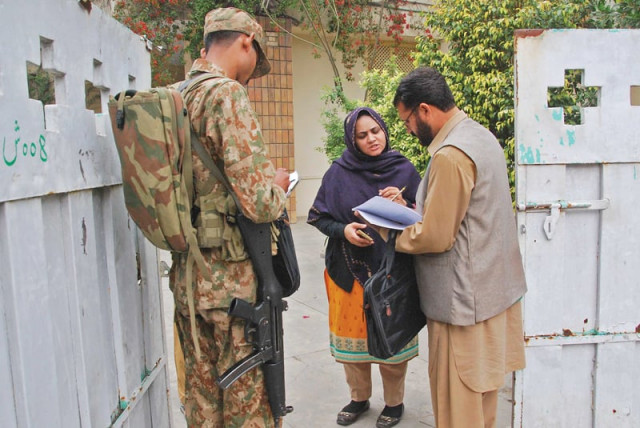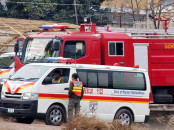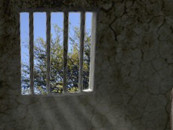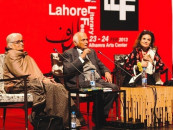Knock, knock. Who’s there?: Census shows most sceptics reside in posh areas
Enumerators claim it is difficult to speak to people living in larger houses.

An enumerator along with a soldier collects information in Lahore. PHOTO: EXPRESS
His purpose on this unusually warm day is to jot down the details of all the households on a lengthy census form. “It is always difficult to speak to people living in big houses,” he complains. “People are sceptical when we ask them for information.”
Qadeer is not the only schoolteacher with such views. Other teachers are experiencing similar behaviour while collecting data from supposedly elite neighbourhoods of Lahore.
Matters were just as difficult for Government Junior Model School Headmaster Riaz Mughal, who was assigned the Faisal Town and Model Town areas of the city for the population count that began last month. “We had a really torrid time in these housing societies,” he says. “People show no respect and we had to convince them even about our identities. Most of the time, we would wait and explain the importance of the census to their servants.”
Mughal narrated a particularly unpleasant experience when he had to deal with a lady who refused to provide any information to the team.
“There was this one lady who first didn’t answer her door. Later, she used vulgar language and even threatened us,” he recalled. “We had to call the police for assistance and that too didn’t go well with her. She warned the police her bureaucrat relative will ‘fix’ all of us.”
The headmaster remembers the team visited the house multiple times during the 15 days of the population count phase of the census, but the woman would not provide any information.
For Mughal, the situation in narrow streets and low-income areas could not be more of polar opposite. “People are polite, helpful and eagerly sharing information with the census teams. They hope it will highlight their problems and help solve them,” he says.
Another teacher Ghulam Mustafa had a different experience, however. He says most of the people he met were friendly and just a few made his job difficult. “It was my first time as part of a census team and it was a learning experience. Working in the heat was hard, but meeting different people was exciting,” he says.
Scepticism over census
Liaquat Ali, another teacher deputed in Lahore, also said many people were sceptical and asked about the benefits of the whole exercise.
“Some said it was only a formality and would make no difference. Others were suspicious of the census team as they had heard that robbers were entering houses in the guise of enumerators,” he said. “As a result, we had to first convince them of our identities and tell them about the importance of the whole exercise.” Qadeer, who was on duty in DHA Lahore, also had a similar experience. “A lot of our time was spent on convincing people about our identity though most people then cooperated,” he said.
Schools without teachers
During the 30 days of the two phases of the census, schools were left understaffed and other teachers filled in at the already shorthanded institutes. At the start of the first phase of the census between March 15 to March 31, schools were closed and no classes were missed.
But schools in the province reopened from April 1, bringing about an onslaught of problems for teachers as well as students. “We had to merge classrooms because many teachers were on census duty,” said a head teacher requesting anonymity.
During the same period, the Punjab government also carried out its enrolment campaign for out-of-school children. Public schools faced problems during the drive, which is also carried out by teachers in their respective areas. “We had to make do with the staff we had, but it affected the enrolment campaign this year,” the head teacher added.
The Punjab government at first had decided not to depute schoolteachers for census duty and the chief minister ordered other public officials be assigned to the job. However, on the very next day, the government reversed its decision and asked teachers to be part of the population count.
A total of 52 master trainers from the education and population and welfare departments were given training. They later went on to train more than 80,000 enumerators.
Census 2017
The first phase of the Sixth Population and Housing Census 2017 was completed on April 13 during which enumerators gathered housing and headcount data in 20,000 blocks of the province.
In Punjab, the first phase of the census was held in 16 districts of Attock, Faisalabad, Jhang, Chiniot, Toba Tek Singh, Hafizabad, Sialkot, Narowal, Lahore, Pakpattan, Vehari, Dera Ghazi Khan, Layyah, Rajanpur, Muzaffargarh and Bahawalpur.
Published in The Express Tribune, April 17th, 2017.



















COMMENTS
Comments are moderated and generally will be posted if they are on-topic and not abusive.
For more information, please see our Comments FAQ